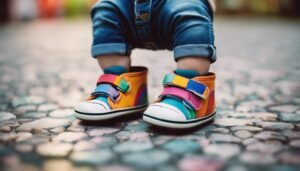When it comes to ensuring the safety and well-being of your toddler, selecting eco-friendly baby products is a wise choice. These carefully crafted items not only prioritize your child's health but also extend their benefits to the environment. By making conscious decisions about the products you introduce into your child's world, you are not only safeguarding their health but also paving the way for a more sustainable future. Curious to learn more about how eco-friendly baby products can make a difference for your little one and the world they'll grow up in?
Key Takeaways
- Opt for sustainable materials like organic cotton and bamboo for your baby products.
- Choose non-toxic toys and clothing made from natural, organic materials.
- Consider eco-friendly diaper and feeding options like biodegradable and organic choices.
- Invest in eco-friendly baby gear made from non-toxic materials for durability and sustainability.
- Practice sustainable parenting by reducing single-use plastics and opting for reusable items.
Benefits of Eco-Friendly Baby Products
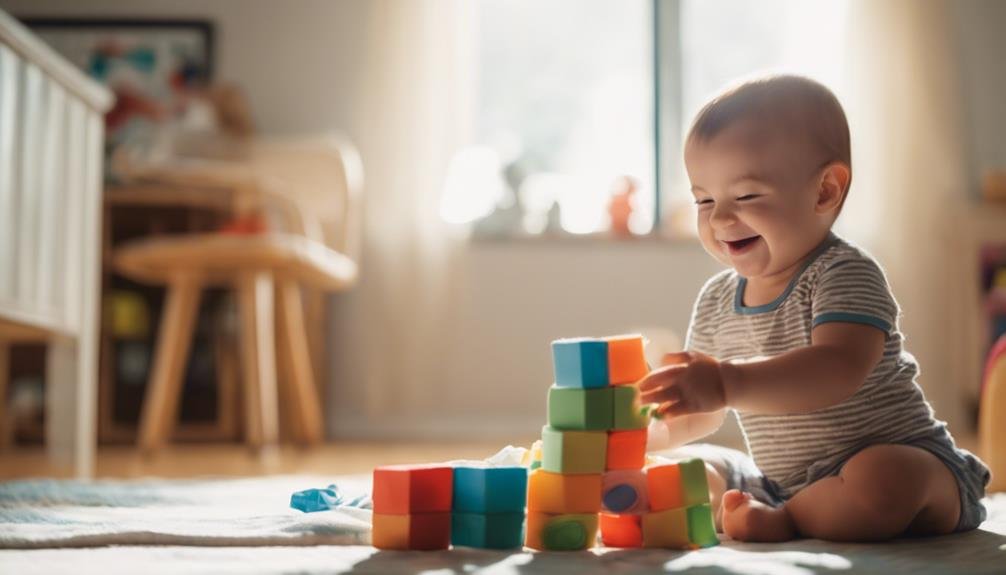
When choosing eco-friendly baby products, you're actively reducing your carbon footprint and contributing to a healthier environment for future generations. By opting for sustainable materials such as organic cotton clothing, bamboo feeding sets, and biodegradable diapers, you're making a positive impact on the planet.
Did you know that conventional baby products often contain harmful chemicals and toxins that can be absorbed by your little one's delicate skin? Eco-friendly alternatives are free from these harmful substances, reducing the risk of skin irritations and allergies. Not only are eco-friendly baby products safer for your child, but they also help in preserving natural resources and reducing pollution.
For instance, opting for reusable cloth diapers instead of disposable ones can prevent tons of waste from ending up in landfills. Making small changes in your baby's everyday products can lead to significant environmental benefits in the long run. So, by choosing eco-friendly options, you aren't only caring for your child but also for the world they'll inherit.
Non-Toxic Toys for Toddlers
Opt for non-toxic toys for toddlers to ensure a safe and healthy play environment for your little ones. Many conventional toys contain harmful chemicals like phthalates, lead, and BPA, which can pose serious health risks to children. Non-toxic toys, on the other hand, are made from natural, organic materials that are free from these harmful substances, making them a safer choice for your child.
When selecting toys for your toddler, look for labels that indicate they're made from materials such as organic cotton, sustainably sourced wood, or non-toxic plastics like BPA-free polyethylene. These materials aren't only safer for your child but also better for the environment.
Studies have shown that exposure to toxic chemicals in toys can lead to developmental delays, allergies, and other health issues in children. By opting for non-toxic toys, you can reduce your child's exposure to these harmful substances and create a healthier play environment for them. Prioritizing non-toxic toys is a simple yet effective way to promote your toddler's well-being while also being environmentally conscious.
Sustainable Diaper Options
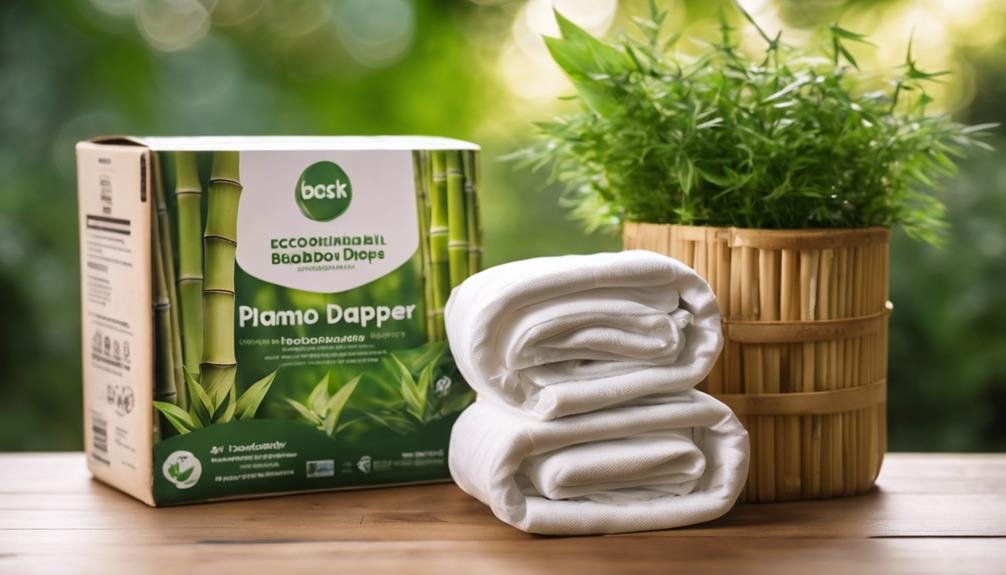
For environmentally conscious parents seeking sustainable diaper options, exploring eco-friendly brands that prioritize biodegradable materials is essential. Opting for diapers made from organic cotton, bamboo, or plant-based materials can significantly reduce your environmental impact. These materials aren't only gentle on your baby's skin but also break down more easily in landfills compared to traditional disposable diapers.
When looking for sustainable diaper choices, consider brands that offer compostable options or diapers made from renewable resources. Some companies even provide diaper subscription services, reducing the carbon footprint associated with frequent trips to the store. Additionally, choosing diapers free from harmful chemicals and fragrances can benefit your baby's health and the environment.
Remember that every diaper change is an opportunity to make a positive impact. By selecting eco-friendly diaper options, you aren't only prioritizing your child's well-being but also contributing to a healthier planet for future generations.
Organic Clothing Choices
To make environmentally conscious choices for your baby's wardrobe, consider opting for organic clothing choices that prioritize sustainability and natural materials. Organic baby clothing is made from materials grown without the use of synthetic pesticides or fertilizers, making them safer for your baby's delicate skin and reducing environmental impact. Additionally, organic cotton clothing tends to be softer and more durable, ensuring your little one stays comfortable while reducing the need for frequent replacements.
| Benefits of Organic Baby Clothing | Description |
|---|---|
| Safer for Baby's Skin | Organic materials reduce exposure to harmful chemicals, preventing skin irritations. |
| Environmentally Friendly | Organic farming practices promote soil health and biodiversity, reducing water pollution. |
| Durable and Comfortable | Organic cotton is softer and more durable than conventional cotton, providing long-lasting comfort. |
Eco-Friendly Feeding Essentials
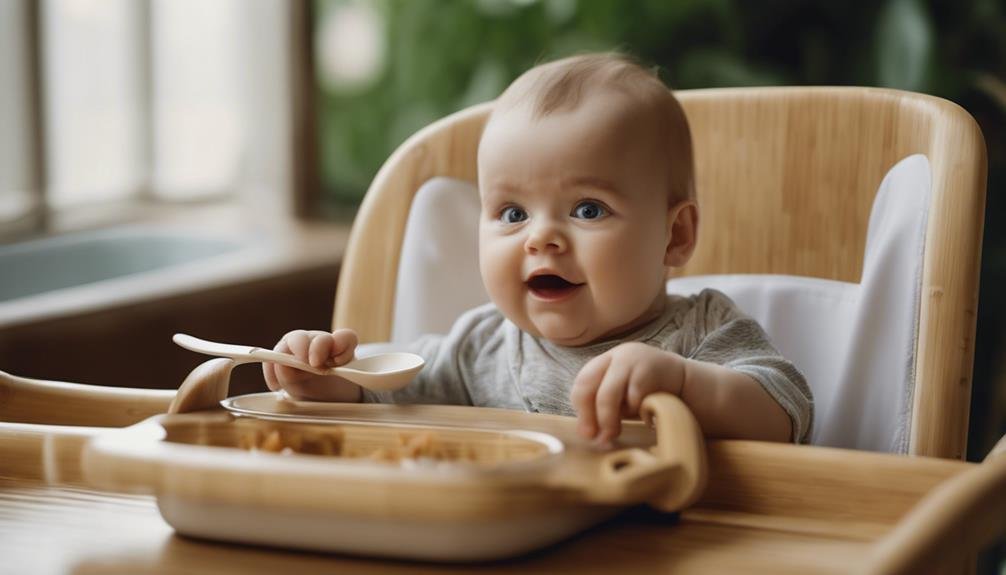
Consider incorporating eco-friendly feeding essentials into your baby's routine to promote sustainability and reduce environmental impact. Opt for items such as organic cotton bibs, reusable silicone feeding pouches, and bamboo dinnerware. These products aren't only gentle on your little one but also on the planet.
When choosing feeding essentials, look for labels like 'BPA-free,' 'phthalate-free,' and 'lead-free' to ensure the products are safe for your child. Additionally, prioritize items made from sustainable materials like bamboo, stainless steel, or silicone, as these materials have a lower environmental impact compared to traditional plastics.
Investing in eco-friendly feeding essentials not only benefits the environment but also sets a positive example for your child. By teaching them about the importance of sustainability from a young age, you're instilling lifelong values of environmental consciousness.
Making small changes in your baby's feeding routine can lead to significant positive impacts on the environment. Choose eco-friendly options to nourish your child while also caring for the planet.
Eco-Conscious Nursery Decor
Incorporate sustainability into your baby's space by opting for eco-conscious nursery decor choices that align with your commitment to a greener lifestyle. Choose furniture made from responsibly sourced wood or bamboo, which are renewable and eco-friendly materials. Look for non-toxic paints and finishes to ensure a healthy environment for your little one. Consider organic bedding and textiles made from materials like organic cotton, which are free from harmful chemicals and pesticides. Incorporate energy-efficient lighting options such as LEDs to reduce energy consumption and create a cozy atmosphere.
When decorating the nursery, think about upcycling or repurposing items to give them a new life and reduce waste. Add indoor plants to improve air quality and bring a touch of nature indoors. Opt for sustainable storage solutions like baskets made from natural fibers or recycled materials. By making these eco-conscious choices, you can create a safe and environmentally friendly nursery that nurtures your baby and aligns with your values.
Safe Bathing Products
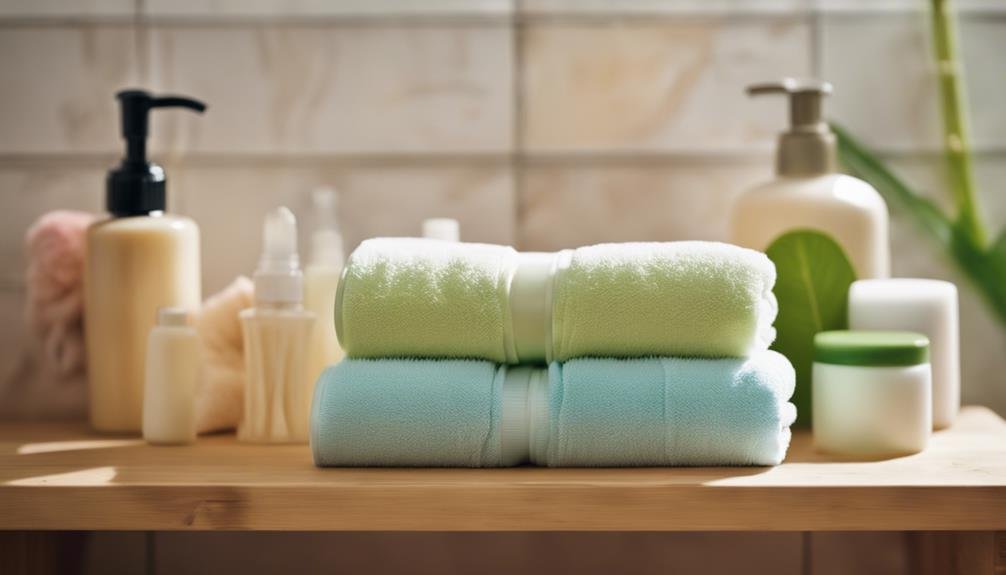
Opt for bath products specially formulated for infants to ensure a safe and gentle bathing experience for your baby. Babies have delicate skin that's more sensitive to harsh chemicals commonly found in adult products. Look for bathing products that are free from sulfates, parabens, phthalates, and artificial fragrances to reduce the risk of skin irritation and allergic reactions. Opting for organic and natural ingredients can also help minimize exposure to harmful substances.
When choosing baby shampoo and body wash, consider products that have been dermatologist-tested and labeled as hypoallergenic. These products are less likely to cause irritation or discomfort to your baby's skin and eyes. Additionally, products with tear-free formulas are designed to be gentle and non-irritating if they accidentally come into contact with your baby's eyes.
Prioritize products that are biodegradable and eco-friendly to minimize the environmental impact of bath time. By selecting safe and gentle bathing products for your baby, you can ensure a soothing and enjoyable experience while promoting both your baby's health and the well-being of the planet.
Eco-Friendly Baby Gear
Choose eco-friendly baby gear to reduce your environmental impact while providing safe and sustainable products for your little one. When selecting baby gear such as strollers, cribs, high chairs, and toys, opt for items made from organic, non-toxic materials like organic cotton, bamboo, or sustainably sourced wood. These materials are free from harmful chemicals and pesticides, ensuring your baby's safety and well-being.
Look for baby gear that's durable and long-lasting to reduce waste and minimize the need for frequent replacements. Investing in high-quality, eco-friendly gear not only benefits the environment but also saves you money in the long run. When possible, choose second-hand or refurbished baby gear to give items a new life and prevent them from ending up in landfills.
Additionally, consider multifunctional baby gear that serves multiple purposes, reducing the number of items you need to purchase. This approach minimizes clutter in your home and reduces resource consumption. By making conscious choices in selecting eco-friendly baby gear, you can create a safer, healthier environment for your child while contributing to a more sustainable future.
Tips for Sustainable Parenting
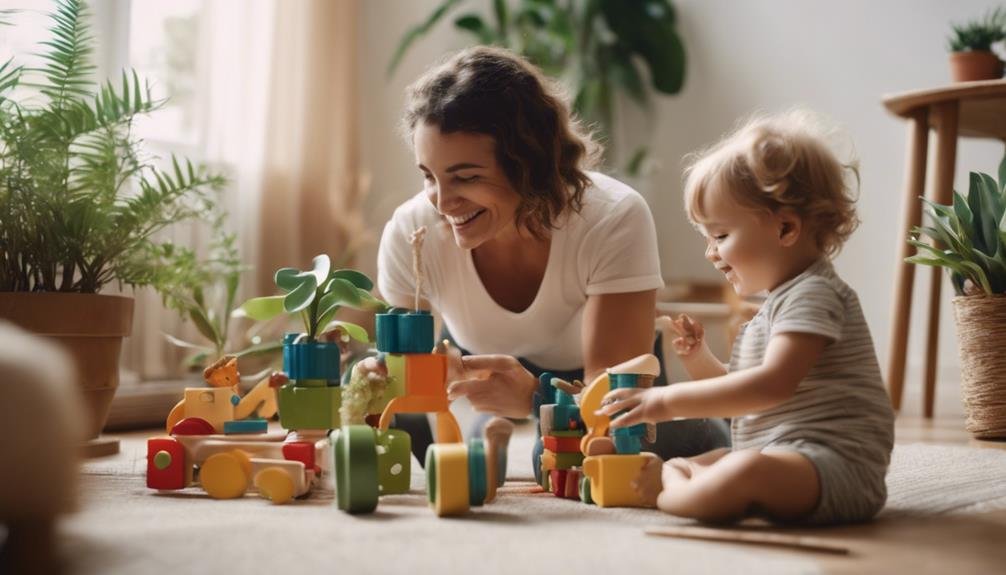
To parent sustainably, prioritize utilizing reusable items and reducing single-use plastics in your daily routines. By making simple changes in your parenting habits, you can significantly lessen your environmental impact and set a positive example for your child. Here are some practical tips for sustainable parenting:
| Tip | Description |
|---|---|
| Opt for cloth diapers | Cloth diapers are reusable and can save thousands of disposable diapers from ending up in landfills. |
| Choose eco-friendly toys | Select toys made from sustainable materials like wood or organic cotton to reduce plastic waste. |
| Use glass or stainless steel bottles | Ditch plastic bottles for feeding your child and opt for glass or stainless steel options for a safer and greener choice. |
These small changes can add up to make a big difference in the long run. By incorporating these sustainable practices into your parenting journey, you not only reduce waste but also create a healthier environment for your child to thrive in.
Frequently Asked Questions
Are Eco-Friendly Baby Products More Expensive Than Traditional Options?
Yes, eco-friendly baby products can be slightly more expensive than traditional options initially. However, considering long-term benefits like durability, safety, and environmental impact, investing in eco-friendly products proves to be a wise choice for your toddler and the environment.
How Can I Dispose of Sustainable Diapers Properly?
When disposing of sustainable diapers, remember to check your local waste management guidelines for specific instructions. Proper disposal ensures minimal environmental impact. Avoid flushing them down the toilet as it can harm plumbing systems.
Can Organic Clothing Choices Help With Sensitive Skin Issues?
Organic clothing choices can benefit sensitive skin by avoiding harsh chemicals and synthetic materials that may trigger reactions. Look for labels like GOTS-certified to ensure purity. Opt for soft, natural fabrics like organic cotton for comfort and peace of mind.
Are There Eco-Friendly Options for Teething Toys?
When it comes to teething toys, you'll be glad to know there are eco-friendly options available. These toys are safe for your little one and the environment, offering a sustainable choice for soothing those sore gums.
What Are Some Eco-Friendly Alternatives to Plastic Baby Bottles?
When looking for eco-friendly alternatives to plastic baby bottles, consider using stainless steel or glass options. These materials are durable, free of harmful chemicals, and can be easily recycled. Make a sustainable choice for your little one.
Conclusion
In conclusion, choosing eco-friendly baby products is like planting a seed for a greener future.
By opting for non-toxic toys, sustainable diapers, organic clothing, and eco-friendly feeding essentials, you aren't only keeping your toddler safe but also helping to protect the environment.
Embracing sustainable parenting practices can make a significant impact on creating a healthier and more eco-conscious world for generations to come.
Make the switch today for a safer and more sustainable tomorrow.


